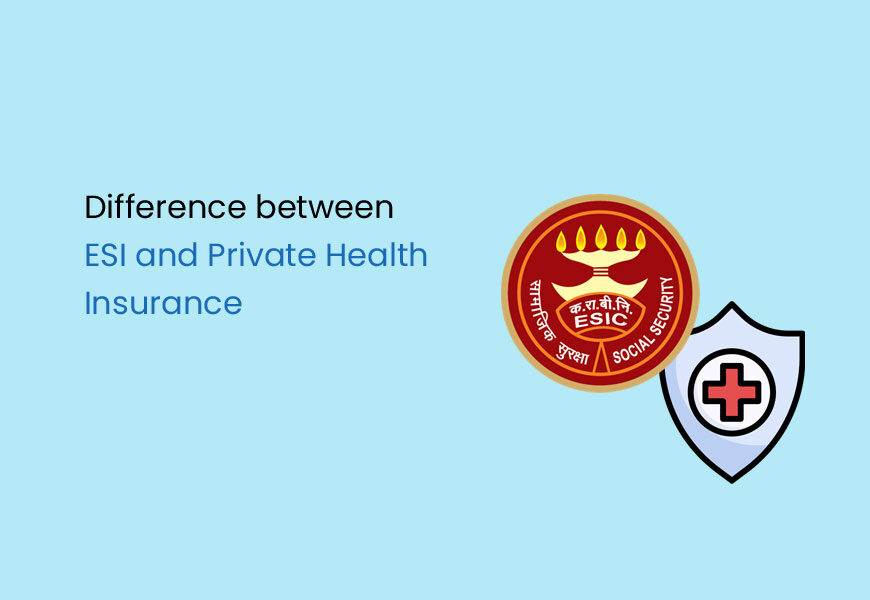Health Insurance provides coverage for the medical expenses of the insured according to the policy terms. You can apply for private health insurance from an insurance company or opt for ESIC (Employees’ State Insurance) provided by the Indian government.
While most formal workers are eligible for ESI, informal workers rarely have insurance. Many of them aren’t aware of ESIC or its benefits. Nevertheless, employers can now provide social security benefits to their informal workers through the TankhaPay app.
But what’s the difference between ESI and private health insurance? Let’s determine which is the best option for informal workers and why.
What Is Employees’ State Insurance (ESI)?
The ESI scheme comes under the Employees’ State Insurance Act 1948, which was aimed to provide social security benefits to workers. ESI mainly provides medical coverage and health insurance benefits for male and female workers. Any worker or employee at a factory, shop, organization, etc., with 10 or more employees is eligible for ESI.
According to the scheme, the employee and their dependents can claim medical cover in case of illness, accidents, injuries, occupational diseases, temporary or permanent disabilities, or other eventualities. Maternity benefits are provided for women workers covered by the act.
The primary idea behind ESI Act is to help workers live with dignity and find proper medical treatment. ESIC provides medical care and support when workers suffer from loss of wages due to their health conditions.
Requirements and Registration for ESI
A company, agency, shop, organization, store, or establishment with 10 or more employees have to register itself with ESIC to provide ESI benefits to the workers. In Maharashtra and Chandigarh, the minimum number of workers/ employees is 20.
However, employers with less than ten employees can also register temporary workers, house help, maids, contract labourers, etc., to receive ESI benefits and medical cover. This can be easily done through the TankhaPay app.
An employee or worker who earns less than Rs. 21,000/- per month is eligible for ESI coverage. Persons with disabilities with a monthly income of Rs. 25,000/- are entitled under the ESI scheme.
Workers contribute 0.75% of their salary every month to pay for the ESI scheme, while the employer will pay 3.25%. These are the revised rates applicable from May 2023.
ESI registration can be completed online through the official ESIC website. Employees can create a user account to register and apply for the Pehchan Card (ESI identification card to be shared in hospitals and dispensaries). The website also has a list of hospitals where ESIC coverage is available.
ESI Helpline Numbers
- Toll-free Number: 1800-11-2526
- Medical Helpline: 1800-11-3839
- ESIC Office Numbers (New Delhi): 011-23234092, 23234093, 23235496, 23234098, 23236051, 23236998, and 23235187
What is Covered and Not Covered in ESI?
Workers can claim medical benefits by visiting ESIC hospitals or dispensaries or those that have tied up with ESIC by showing their ESI cards. The ESI card acts as ID proof and is crucial to claim the benefits. For cash benefits, the employee can raise a claim through their ESIC online account or through the employer. However, it’s crucial to know what’s covered by the scheme and what’s not.
Covered by ESIC
Medical benefits
Employees get medical benefits from the very first day after enrollment. They can get treatment in any of the allotted ESI hospitals and dispensaries by showing their ESI card. The benefits apply to a range of medical treatments.
The employee and all family members dependent on the employee are eligible for ESI coverage and free medical treatment (& medication). The following medical benefits are covered under the scheme:
- Allopathic, Homeopathy, Ayurvedic, Unani, Sidha, and Yoga therapy
- Specialist consultation
- In-patient treatment
- Ambulance services
- Imaging and laboratory services
- Integrated family welfare and immunisation
- Domiciliary treatments
- Free medication, aids, artificial limbs, etc.
- Special provisions
- Reimbursement
ESIC also provides medical coverage for retired employees and their spouses for a payment of Rs. 10/ month in lump sum for a year in advance.
Temporary and permanent disability
Employees who suffer from temporary or permanent disability due to workplace injuries or occupational hazards can claim rehabilitation benefits, vocational training, monthly pension, and provisions for getting prosthetic/ artificial limbs.
Sickness/ Illness
Employers who have completed 78 days of work with the establishment can avail of sick leave for up to 91 days for two consecutive periods. The worker will be paid 70% of their daily wage for this period. Depending on individual cases, sick leaves can be extended for longer durations.
Maternity
Women workers get up to 26 weeks of fully paid leave as a maternity benefit for their first two children. They can also avail of cash benefits based on other factors. ESIC covers paid maternity leave for miscarriages, medical termination of pregnancies, and adoptions.
Dependants
This benefit is provided when the employee dies at work or is severely disabled due to workplace injury. The dependants get 90% of the employee’s daily wages as a pension. The disabled employee can claim medical benefits for treatment.
Funeral costs of the insured
In case of death, the employee’s family can claim Rs. 15,000/- towards funeral costs. The amount will be paid to the person who performs the last rites or the dependant.
Other ESIC benefits include old-age medical care, skill upgradation through government schemes, and confinement costs.
Not Covered by ESIC
Workers with more than Rs. 21,000/- or Rs. 25,000/- (for people with disabilities) as monthly wages are not covered by ESIC. The benefits provided under ESIC cannot be used as private funds.
What is Private Health Insurance?
As the name suggests, private health insurance is provided by private or independent insurance companies. Though the insurers have to adhere to government regulations, they operate differently and don’t provide government benefits like ESIC. Having health insurance or a medical policy reduces the burden on the person as the insurer will pay a partial or full amount of the expenses due to illness or accidents.
Types of Private Health Insurance
Health insurance can be classified into the following types:
- Family Health Insurance
- Senior Citizen Health Insurance
- Critical Illness Health Insurance
- Health Insurance for Parents
- Coronavirus Health Insurance
- Diabetic Health Insurance
- Personal Accident Health Insurance
The range of health insurance options available ensure that people choose the best insurance coverage and get maximum benefits from their medical policy.
However, informal workers rarely have private health insurance as most of them cannot afford to pay the premium amounts.
What is Covered and Not Covered in Private Health Insurance?
Covered
- In-patient hospitalization expenses of people covered under the policy if the stay/ treatment is more than 24 hours.
- Expenses incurred for pre-existing diseases or illnesses can also be covered after the waiting period on the medical policy.
- The range of illnesses/ diseases/ injuries/ surgeries/ treatments covered by private health insurance depends on the insurer and the policy type.
Not Covered
Except for accidental emergencies, claims that arise during the first 30 days of buying the policy are not covered by the insurer.
ESI Vs. Private Health Insurance
| ESIC (Employees’ State Insurance) | Private Health Insurance |
| It is an Indian government scheme under the ESIC Act, 1948 | It is provided by private insurance companies registered under IRDAI. |
| Workers employed in an establishment with 10 or more staff and earning less than Rs. 21,000/month are eligible for ESI. The establishment has to register with ESIC to provide benefits to workers. | An individual can apply for private health insurance directly from the insurer. Employers also have to provide group health insurance to employees.
Those covered under ESI are not eligible for group health insurance. |
| It provides coverage for the employee, family members, parents, and dependents. | It provides coverage only for the policyholders by default. Dependents can be included by paying an additional premium. |
| Free medication, aids, artificial limbs, and treatment at all ESIC hospitals and dispensaries with no upper limit. | There’s an upper limit on the expenses the insurer will pay. This depends on the policy type and premium amount. |
| No waiting period to claim ESI benefits. The employee and dependents are covered from day one. | There’s a waiting period of 2-4 years. It depends on the insurer. |
| Varied treatments are covered by ESIC (allopathy, homeopathy, ayurvedic, unani, etc.) | The insurer will determine the system of treatments eligible under private health insurance. |
| The employee pays 0.75% of their monthly salary as an ESI premium. The employer will add 3.25% of the same amount. | The premium amount depends on the policy and the add-ons opted by the individual. |
| ESIC is budget-friendly and covers several benefits, such as disabilities, maternity aid, etc. | Private health insurance is expensive and doesn’t cover all medical conditions. |
Provider
ESI is a government scheme where employers have to register with the ESIC and record the details of their employees/ workers to provide them medical coverage and social security benefits.
A private health insurance policy is taken by the person to ensure coverage for themselves and/ or their family members for medical conditions. Employers also provide group health insurance to employees. In April 2020, IRDAI announced that employers have to follow a standard operating procedure as a part of the Revised Consolidated Guidelines for Resumption of Work Activities of the Ministry of Home Affairs. Employees who are not eligible for ESI can be covered under GMC (Group Medical Unit).
Coverage
In ESIC, not only the employees but even the dependents are covered by the scheme without any additional premium. The employee’s parents, spouse, children, and other any other dependents are eligible for free medical treatment and medicines at ESI hospitals and dispensaries.
In private health insurance, the primary coverage is limited to the policyholder. You have to pay an extra premium to get coverage for your family members, which increases your expenses. Furthermore, parents are not covered under private insurance. Additionally, all treatments and medication are not free, even when you have private health insurance. The claim is subject to approval by the insurer. The insurance company will determine the amount based on the claim. You have to bear the rest from your pocket.
Eligibility
All workers at an establishment/ shop/ entertainment center/ etc. with a minimum of 10 employed staff are eligible for ESI benefits if they earn less than Rs. 21,000/- a month. The monthly salary limit for people with disabilities is Rs. 25,000/-. There is no gender bias in ESI eligibility. Furthermore, there is no waiting period to claim the benefits.
Even informal workers, temporary and contract labourers, etc., from the organized and unorganized sectors, can avail of the social security benefits of ESI through the TankhaPay app. Employers can use the app to register their workers for the scheme.
Most individuals are eligible for private health insurance. Children aged from 90 days to 25 years are eligible to be dependents in family health insurance policy. Adults from 18 to 65 years can buy their own medical insurance. Some insurers offer senior citizen coverage for people from 65 to 80 years. However, the actual eligibility and claim criteria change from one insurer to another. Insurance companies offer a range of policies depending on your requirements.
Cost
ESI premium is paid by the employee and employer. According to the latest regulations, the worker will pay 0.75% of their monthly salary towards the ESI premium. The employer will add 3.25% to this amount every month. ESI is affordable and budget-friendly. You should share your ESI number with your new employer to continue getting coverage under the scheme.
Private health insurance is expensive. The premium can cost thousands of rupees based on the scope of the coverage and add-ons like maternity cover rider, etc. There is a waiting period of 2 to 4 years to claim the medical expenses for existing health conditions.
Role of TankhaPay in Providing ESI to Informal Workers
TankhaPay is India’s first app to pay social security benefits to informal workers across all industries, including domestic & gig employment. Employers can help their workers avail of various governmental benefits like EPF, ESIC, maternity and disability benefits, free hospitalization, etc.
The app can be downloaded from Google Play Store and iOS App Store. It’s a great solution to manage employee salaries, KYC, social security payouts, track employee attendance, and automate salary payments. No need to register for PF or ESI to provide benefits to your workers. Enjoy a hassle-free experience with the TankhaPay app.
Conclusion
According to Statista, close to 514 million Indians were covered under medical insurance in 2021. About 343 million benefits from the government’s social security scheme, while only 53.14 million have individual health insurance. ESIC is the best choice to ensure that informal workers and temporary labourers like maids, delivery personnel, construction workers, etc., have insurance to pay for their medical expenses.
Download the TankhaPay app today to provide social security benefits to your informal workers and help them lead dignified lives.
FAQs
Is medical test mandatory for private health insurance?
Medical tests are not mandatory for private health insurance. However, insurance companies ask for medical reports for certain conditions. For example, insurers may ask applicants over 45 or those with health ailments to provide the latest medical reports before approving the application. The types of tests depend on the applicant’s age and health condition.
Can employers use TankhaPay to provide ESI coverage to less than ten workers?
Yes. Employers can use the TankhaPay app to provide ESIC for any number of informal workers. It doesn’t matter if you have just 3 or 5 workers or even more than 100, you can still use the app to verify their KYC and register the informal workers to receive ESIC benefits. It is easy and automated to save you time.





















